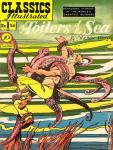Book 8 - The Rock
Chapter 8 - Importunæque Volucres
Gilliatt slept well; but he was cold, and this awoke him from time to time. He had naturally placed his feet at the bottom, and his head at the entrance to his cave. He had not taken the precaution to remove from his couch a number of angular stones, which did not by any means conduce to sleep.
Now and then he half-opened his eyes.
At intervals he heard loud noises. It was the rising tide entering the caverns of the rocks with a sound like the report of a cannon.
All the circumstances of his position conspired to produce the effect of a vision. Hallucinations seemed to surround him. The vagueness of night increased this effect; and Gilliatt felt himself plunged into some region of unrealities. He asked himself if all were not a dream?
Then he dropped to sleep again; and this time, in a veritable dream, found himself at the Bû de la Rue, at the Bravées, at St. Sampson. He heard Déruchette singing; he was among realities. While he slept he seemed to wake and live; when he awoke again he appeared to be sleeping.
In truth, from this time forward he lived in a dream.
Towards the middle of the night a confused murmur filled the air. Gilliatt had a vague consciousness of it even in his sleep. It was perhaps a breeze arising.
Once, when awakened by a cold shiver, he opened his eyes a little wider than before. Clouds were moving in the zenith; the moon was flying through the sky, with one large star following closely in her footsteps.
Gilliatt's mind was full of the incidents of his dreams. The wild outlines of things in the darkness were exaggerated by this confusion with the impressions of his sleeping hours.
At daybreak he was half-frozen; but he slept soundly.
The sudden daylight aroused him from a slumber which might have been dangerous. The alcove faced the rising sun.
Gilliatt yawned, stretched himself, and sprang out of his sleeping place.
His sleep had been so deep that he could not at first recall the circumstances of the night before.
By degrees the feeling of reality returned, and he began to think of breakfast.
The weather was calm; the sky cool and serene. The clouds were gone; the night wind had cleared the horizon, and the sun rose brightly. Another fine day was commencing. Gilliatt felt joyful.
He threw off his overcoat and his leggings; rolled them up in the sheepskin with the wool inside, fastened the roll with a length of rope-yarn, and pushed it into the cavern for a shelter in case of rain.
This done, he made his bed--an operation which consisted in removing the stones which had annoyed him in the night.
His bed made, he slid down the cord on to the deck of the Durande, and approached the niche where he had placed his basket of provisions. As it was very near the edge, the wind in the night had swept it down, and rolled it into the sea.
It was evident that it would not be easy to recover it. There was a spirit of mischief and malice in a wind which had sought out his basket in that position.
It was the commencement of hostilities. Gilliatt understood the token.
To those who live in a state of rude familiarity with the sea, it becomes natural to regard the wind as an individuality, and the rocks as sentient beings.
Nothing remained but the biscuit and the rye-meal, except the shell-fish, on which the shipwrecked sailor had supported a lingering existence upon "The Man Rock."
It was useless to think of subsisting by net or line fishing. Fish are naturally averse to the neighbourhood of rocks. The drag and bow net fishers would waste their labour among the breakers, the points of which would be destructive only to their nets.
Gilliatt breakfasted on a few limpets which he plucked with difficulty from the rocks. He narrowly escaped breaking his knife in the attempt.
While he was making his spare meal, he was sensible of a strange disturbance on the sea. He looked around.
It was a swarm of gulls and seamews which had just alighted upon some low rocks, and were beating their wings, tumbling over each other, screaming, and shrieking. All were swarming noisily upon the same point. This horde with beaks and talons were evidently pillaging something.
It was Gilliatt's basket.
Rolled down upon a sharp point by the wind, the basket had burst open. The birds had gathered round immediately. They were carrying off in their beaks all sorts of fragments of provisions. Gilliatt recognised from the distance his smoked beef and his salted fish.
It was their turn now to be aggressive. The birds had taken to reprisals. Gilliatt had robbed them of their lodging, they deprived him of his supper.
